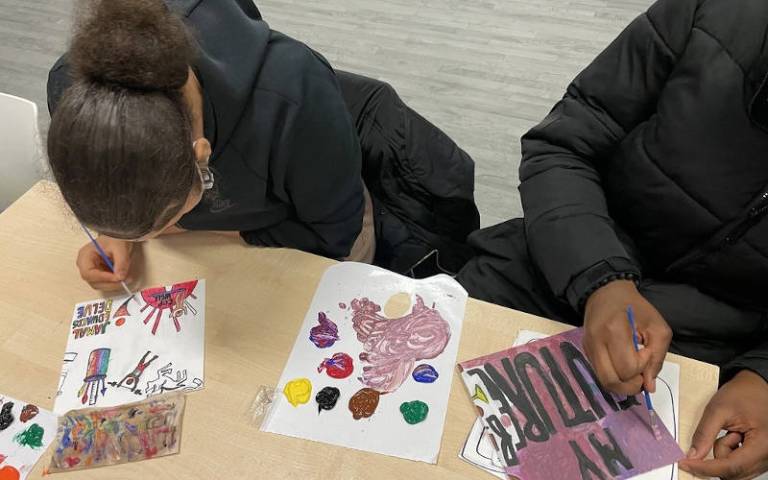UCL works with Ealing charity to co-create more focused mental health support for young Londoners
A collaborative project between UCL and a London charity is helping 12 to 17 year olds in London to co-create the mental health support they need most.

1 August 2023
What was it like for young Black and ethnic minority people living in London during the pandemic, and what impact did it have on their mental health?
This was the question at the heart of a knowledge exchange project that started after UCL’s Dr Keri Wong visited a community centre in Ealing. The centre was run by the Jamal Edwards Delve charity, a grassroots youth organisation founded by the late Jamal Edwards MBE.
Dr Wong, Associate Professor of Developmental Psychology at the IOE, UCL’s Faculty of Education and Society, and co-Director of the Centre for Education and Criminal Justice, led the project.
Dr Wong explains: “I was invited to give a talk to the young people about their mental health, given my research in this area, and I could see straight away that there was this pressing need to do something practical to help them. These are young people who are dealing with things like neighbourhood crime on a regular basis, and then they had the pandemic to cope with on top of that.”
The project Dr Wong and her team came up with involved co-designing life skills and mental health support workshops, based on the needs and experiences of young people aged 12 to 17 years old. Part of the CopeWell study (now published in the BMJ Open), it was run as a collaborative project between UCL and the Jamal Edwards Delve charity and its young people.
“We wanted to design something that would bring to light voices of young people from ethnic minority backgrounds, as we don’t often hear from them, and therefore don’t know enough about how to help them,” explains Dr Wong. “But young people are the experts in what they need; we need to listen to them.”
Involving UCL students to do the research
UCL students from Dr Wong’s Lab were involved in the interviews and focus groups. They talked to ten young people aged between 12 and 17 years, individually and in groups, about what it was like for them during the COVID-19 pandemic and afterwards.
Using the findings, the team went on to co-create mental health-focused workshops with the young participants. Working with UCL and external speakers, sessions focused on university life, how to improve sleep, rethink body image, and social media use, as well as using storytelling and art to improve mental health.
“The feedback from the young people has been overwhelmingly positive. For many of them, it was the first time they’d ever spoken about their mental health,” says Dr Wong.
Psychology with Education BSc alumna Romane Lenoir was the student leading the interviews. Romane said: “By giving voice to communities less heard from, we hope to inspire larger-scale research and develop tailored mental health support for Black and mixed ethnic minority communities.”
Underlining UCL’s commitment to community engagement
Off the back of this first project, Dr Wong and her team subsequently went on to work on a second one with Islington Council. Over 30 young people have now benefitted from the training, and the Council are looking to offer it as a regular part of their support through their Youth Progression Team.
Both projects have been funded by UKRI Research England Higher Education Innovation Funding (HEIF), managed by the Knowledge Exchange Funding team in UCL Innovation & Enterprise.
The Business and Innovation Partnerships team in UCL Innovation & Enterprise also helped with all aspects of the partnership process, including the funding applications.
“These projects underline UCL’s commitment to engaging with communities, and particularly hard to reach ones. Working on this, in collaboration with organisations on the ground, has allowed us to come up with solutions we wouldn’t have been able to design on our own. The knowledge exchange funding we got with the help of the Partnerships team also meant we could be really flexible, and design something young people genuinely wanted and needed,” adds Dr Wong.
Dr Wong and her team at the UCL Centre for Education and Criminal Justice (ECJ) are now building a network of academics, charities and partners. As well as sharing good practice, the network will encourage more co-developed projects to support marginalised and hard-to-reach populations with the support of the UCL Innovations Network Fund.
Links
Find out more about:
- Dr Keri Wong’s experience of working on these projects
- CopeWell Study
- Academic profile: Dr Keri Wong
- Businesses: develop a partnership with UCL
- UCL staff: partner with external organisations
- Innovation funding for UCL staff
- Centre for Education and Criminal Justice
- BMJ Open article
Photo © UCL and Jamal Edwards Delve charity
 Close
Close

